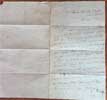Written by Soyer, whilst in the Crimea.
"Scutari Barrack Hospital, Constantinople. 26th April 1855. My Dear Sir I am happy to inform you that since the last time I had the pleasure of shaking hands with you, I have employed my time with the greatest success and no doubt inform the receipt you will have heard thro the public press of the rapid progress I have made – I have now left for a few days the great Barrack Hospital of Scutari for Kullalee, where my services are also required - I shall shortly proceed to Balaclava. I have not yet presented my accounts which I need hardly say far exceeds the amount advanced me by the Government, having brought with me two cooks from Paris, besides my Secretary, but will do so very shortly – A Soyer - I apprehend W. Hilton, the Purveyor in Chief is the gentleman to whom I shall have to apply – With the highest consideration I have the honour to be yours very ably. A Soyer. ___ Croome Esquire."
1½ pages of Soyer's light script written while in the Crimea. Signed at the bottom of the first page, including the extra half page postscript with the second signature. Measuring 13 x 7½ inches with folds‚ in good clean condition‚ with an integral blank leaf. The letter housed in a slip inside a handsome folder with red marbled paper and label.
- The Crimean War was a military conflict fought between October 1853 and March 1856, in which Russia lost to an alliance of France, the British Empire, the Ottoman Empire and Sardinia. Alexis Soyer (1810 – 1858)‚ the French chef who became the most celebrated cook in Victorian England, enhanced his reputation by his involvement in the welfare of the wounded soldiers in the war. His reputation was already assured as he had also worked to alleviate the suffering of the Irish poor in the Great Irish Famine (1845–1849)‚ and towards their relief, he contributed a penny for every copy sold of his pamphlet 'The Poor Man's Regenerator' (pub; 1847). During the Crimean War‚ Soyer went to the Crimea at his own expense to advise the army on cooking more nutritious and healthy food. Later he was paid his expenses and wages equivalent to those of a Brigadier-General. In the North Wales Chronicle of Saturday May 5th 1855, in a quite full account written by Soyer himself and sent to the paper, we learn that he opened his large kitchen on the site of a previous Turkish kitchen, on Easter Monday at the huge Barrack Hospital in Scutari. Present was a number of Ladies and Gentlemen who tasted the new diet, compared to dishes alongside of the old diet. It was a huge success. In the article, Soyer expresses a fulsome gratitude to Florence Nightingale for her good organisational skills and help in providing him with all the materials he needed to start the Kitchen. (It is recorded elsewhere however, that she did not much appreciate Soyer and his efforts, openly criticising him). Soyer's work was very successful; it started to save countless lives that otherwise, before his efforts, would have been lost. The mortality rate alone at Scutari's Barrack Hospital was 100 soldiers and upwards daily. An unimaginable toll. Florence Nightingale's well documented, heroic nursing standards were not enough. However much Nightingale was put out by the flamboyant Soyer, the pragmatic synergy between their differing aspects of care; medical combined with a nutritious balanced diet was crucial. In the "Memoirs of Soyer" written and published 1859, by his two secretaries, F.Volant & J.R.Warren, they inform us that the death rate was putting such a strain on the hospital staff, that the bodies were just rolled up in their bed blankets and buried in mass pits. Soyer also provided the new diet at Balaclava, and at three institutions at Kullalee, and was very well supported there by Lady Stafford, having been previously interviewed about his Catering needs by her husband, Lord Stafford. At that time also, Soyer was waiting for his soon-to-be-famous new model camp-stove which was capable of cooking continuously for 200 soldiers every three hours. One can only imagine the magnitude of effort there. Soyer himself did not escape unscathed. His two secretaries also write that Soyer himself, due to overwork, fever and severe dysentery over a long period of time nearly died. Interestingly, he was saved by the intelligent ministrations of a very young 21 year old doctor, Mr Ambler. Despite, at first, large misgivings about the young Dr Ambler, he quickly revived Soyer with a diet of iced drinks, a little solid food and a daily quantity of eggs beaten up with port wine. For the rest of his time in the Crimea, the young doctor became a very good friend and companion to an extremely grateful Soyer. Finally, at the end of the Welsh newspaper article is a wonderful praising statement by Brigadier General, Commanding Troops - W. Pauley, where he fully approves of the way Soyer has taken the usual provisions, re-arranged the proportions and made such a difference with the simple act of cooking. As all Soyer’s personal papers were burned just after his death, then this extremely rare and pertinent letter, could only have come from the aforementioned Mr Cromme’s extant estate.





click on image to enlarge

Ephemera category
ref number:
11244